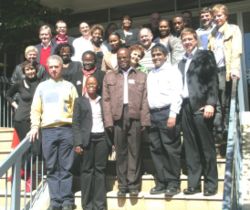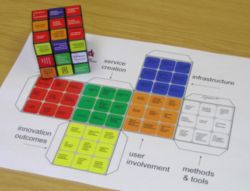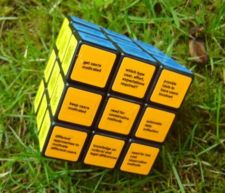Supporting Living Labs in South Africa
|

Overview
The lack of a proper understanding what triggers innovations and which innovations prove to be successful in different environmental, social and cultural contexts poses a big threat to the design of real-world innovation. This is in particular true for South Africa. Being a ‘society in transition’ facing the challenge of social change and social innovation South Africa needs to understand how to do advanced African innovation research. Designing real-world innovation in an African way might therefore differ from the indigenous tradition and might not be similar to the western world as well; however, what’s similar is that its start is community-driven.
The goal of this website is to support the growth of a community of Living Lab researchers in Southern Africa and ultimately, in Africa. Meraka, as a member of this network, supports this initiative as part of its mandate and |vision.
The Focus
Specialists in this group have a joint vision of South Africa as a “competitive and progressive 21st century nation". Through user-driven, open innovation initiatives; bring forth a new mindset of the South African society as equal custodians of the building blocks to all-forms-of- access-&-inclusion.
We are participating in the global economy and want to be recognized internationally for the contribution we will make as co-creators of the Global Knowledge Society.
Living Lab Initiatives in South Africa
- Sekhukhune Living Lab
- Rural Enterprise creation
- Limpopo Living Lab
- Dwesa Living Lab
- Partnership in the Eastern Cape between Universities of Rhodes & Fort Hare, Nokia Siemens Networks, Meraka Institute and COFISA
- Rural connectivity and ICT applications
- Feasibility study-phase in June 2008
- Ndlovu Living Lab
- Partnership between the Ndlovu Medical Centre, Elandsdoorn Development Trust, INTEL and Meraka
- Telemedicine and rural connectivity
- Soshanguve Living Lab
- Planned by Tshwane University of Technology (ICT Faculty)
- Education, Research, Community Development, Job Creation
- Bushbuck Ridge
- SAP Research and Wits University
- Patient Health System for chronically ill patients in rural areas
International Linkages
ENOLL
COFISA
Methods and Tools
The Harmonization Cube
 |
 |
The six sides of the cube correspond with the following topics:
- User Involvement (Orange)
- Service Creation (Green)
- Infrastructure (Blue)
- Governance (Red)
- Innovation Outcomes (Yellow)
- Methods & Tools (White)
A do-it-yourself foldable paper version of the Harmonization Cube
Events
2008-06-00 Supporting the Living Labs in South Africa 2008-2010 Strategy Workshop
2008-06-11 COFISA Workshop - Living Lab development
2008-05-17 to 24 COFISA-Finland Living Labs Collaboration Visit
2008-05-12 to 16 Collaboration @ Rural 4th Plenary meeting
2008-05-07 to 09 IST Africa, Windhoek, Namibia
2008-04-24 Workshop at Meraka Institute
Publications
(Section Under construction)
Living Labs discussion forum
A Google discussion group called Supporting Living Labs in South Africa has been created as a discussion and interaction platform. Any Living Lab practitioner is welcome to join.
Name for the Initiative
The current name is a working title. We are looking for a name for the initiative. Suggestions are listed below. Please provide contributions.
- Supporting Living Labs in Southern Africa (SLLiSA)
- Living Labs of Southern Africa (LLOSA or LLoSA)
- Living Labs in Southern Africa (LLISA or LLiSA)
Contact Details
| Contact Person: | Shela Boshomane |
|---|---|
| Tel: | +27(0)12 841 4432 |
| Fax: | +27(0)12 841 4720 |
| Email: | sboshomane[at]csir.co.za |
| Contact Person: | Mario Marais |
|---|---|
| Tel: | +27(0)12 841 3771 |
| Fax: | +27(0)12 841 4720 |
| Email: | mmarais[at]csir.co.za |





